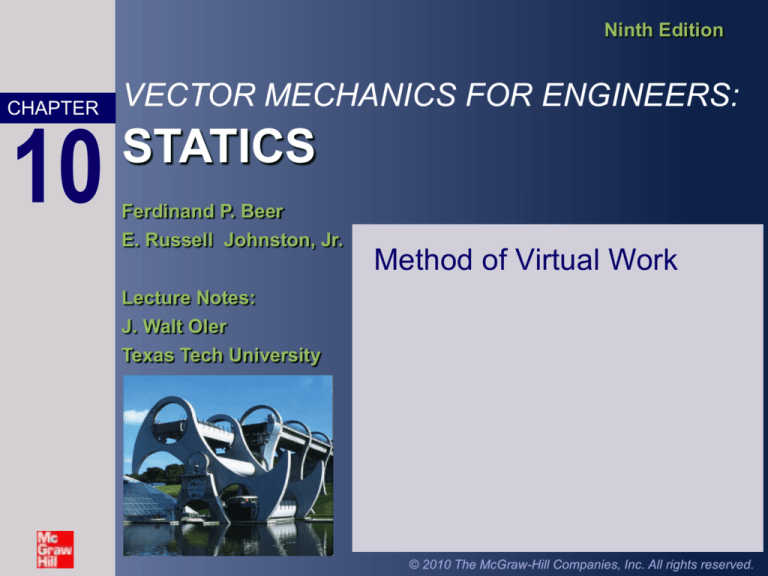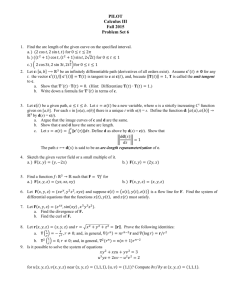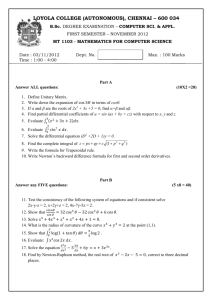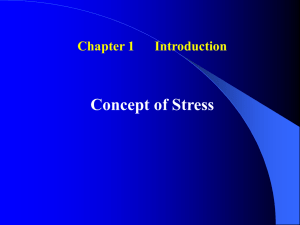
Ninth Edition
CHAPTER
10
VECTOR MECHANICS FOR ENGINEERS:
STATICS
Ferdinand P. Beer
E. Russell Johnston, Jr.
Method of Virtual Work
Lecture Notes:
J. Walt Oler
Texas Tech University
© 2010 The McGraw-Hill Companies, Inc. All rights reserved.
Ninth
Edition
Vector Mechanics for Engineers: Statics
Contents
Introduction
Work of a Force
Work of a Couple
Principle of Virtual Work
Applications of the Principle of Virtual Work
Real Machines. Mechanical Efficiency
Sample Problem 10.1
Sample Problem 10.2
Sample Problem 10.3
Work of a Force During a Finite Displacement
Potential Energy
Potential Energy and Equilibrium
Stability and Equilibrium
Sample Problems 10.4
© 2010 The McGraw-Hill Companies, Inc. All rights reserved.
10 - 2
Ninth
Edition
Vector Mechanics for Engineers: Statics
Introduction
• Principle of virtual work - if a particle, rigid body, or system of
rigid bodies which is in equilibrium under various forces is given
an arbitrary virtual displacement, the net work done by the external
forces during that displacement is zero.
• The principle of virtual work is particularly useful when applied
to the solution of problems involving the equilibrium of
machines or mechanisms consisting of several connected
members.
• If a particle, rigid body, or system of rigid bodies is in equilibrium,
then the derivative of its potential energy with respect to a variable
defining its position is zero.
• The stability of an equilibrium position can be determined from the
second derivative of the potential energy with respect to the position
variable.
© 2010 The McGraw-Hill Companies, Inc. All rights reserved.
10 - 3
Ninth
Edition
Vector Mechanics for Engineers: Statics
Work of a Force
dU F dr = work of the force F corresponding to
the displacement dr
dU F ds cos
0, dU F ds
, dU F ds
2 , dU 0
dU Wdy
© 2010 The McGraw-Hill Companies, Inc. All rights reserved.
10 - 4
Ninth
Edition
Vector Mechanics for Engineers: Statics
Work of a Force
Forces which do no work:
• reaction at a frictionless pin due to rotation of a body
around the pin
• reaction at a frictionless surface due to motion of a
body along the surface
• weight of a body with cg moving horizontally
• friction force on a wheel moving without slipping
Sum of work done by several forces may be zero:
• bodies connected by a frictionless pin
• bodies connected by an inextensible cord
• internal forces holding together parts of a rigid body
© 2010 The McGraw-Hill Companies, Inc. All rights reserved.
10 - 5
Ninth
Edition
Vector Mechanics for Engineers: Statics
Work of a Couple
Small displacement of a rigid body:
• translation to A’B’
• rotation of B’ about A’ to B”
W F dr1 F dr1 dr2
F dr2 F ds2 F rd
M d
© 2010 The McGraw-Hill Companies, Inc. All rights reserved.
10 - 6
Ninth
Edition
Vector Mechanics for Engineers: Statics
Principle of Virtual Work
• Imagine the small virtual displacement of particle which
is acted upon by several forces.
• The corresponding virtual work,
U F1 r F2 r F3 r F1 F2 F3 r
R r
Principle of Virtual Work:
• If a particle is in equilibrium, the total virtual work of forces
acting on the particle is zero for any virtual displacement.
• If a rigid body is in equilibrium, the total virtual work
of external forces acting on the body is zero for any
virtual displacement of the body.
• If a system of connected rigid bodies remains connected
during the virtual displacement, only the work of the
external forces need be considered.
© 2010 The McGraw-Hill Companies, Inc. All rights reserved.
10 - 7
Ninth
Edition
Vector Mechanics for Engineers: Statics
Applications of the Principle of Virtual Work
• Wish to determine the force of the vice on the
block for a given force P.
• Consider the work done by the external forces
for a virtual displacement . Only the forces P
and Q produce nonzero work.
U 0 U Q U P Q xB P yC
x B 2l sin
x B 2l cos
yC l cos
yC l sin
0 2Ql cos Pl sin
Q 12 P tan
• If the virtual displacement is consistent with the
constraints imposed by supports and connections,
only the work of loads, applied forces, and
friction forces need be considered.
© 2010 The McGraw-Hill Companies, Inc. All rights reserved.
10 - 8
Ninth
Edition
Vector Mechanics for Engineers: Statics
Real Machines. Mechanical Efficiency
mechanical efficiency
output work of actual machine
output work of ideal machine
output work
input work
2Ql cos
Pl sin
1 cot
• For an ideal machine without friction, the
output work is equal to the input work.
• When the effect of friction is
considered, the output work is reduced.
U Qx B PyC Fx B 0
0 2Ql cos Pl sin Pl cos
Q 12 Ptan
© 2010 The McGraw-Hill Companies, Inc. All rights reserved.
10 - 9
Ninth
Edition
Vector Mechanics for Engineers: Statics
Sample Problem 10.1
Determine the magnitude of the couple M required to
maintain the equilibrium of the mechanism.
SOLUTION:
• Apply the principle of virtual work
U 0 U M U P
0 M PxD
xD 3l cos
xD 3l sin
0 M P 3l sin
M 3Pl sin
© 2010 The McGraw-Hill Companies, Inc. All rights reserved.
10 - 10
Ninth
Edition
Vector Mechanics for Engineers: Statics
Sample Problem 10.2
Determine the expressions for and for the tension in the
spring which correspond to the equilibrium position of the
spring. The unstretched length of the spring is h and the
constant of the spring is k. Neglect the weight of the
mechanism.
SOLUTION:
• Apply the principle of virtual work
U U B U F 0
0 PyB FyC
yB l sin
yB l cos
yC 2l sin
yC 2l cos
F ks
k yC h
k 2l sin h
0 Pl cos k 2l sin h 2l cos
P 2kh
4kl
F 12 P
sin
© 2010 The McGraw-Hill Companies, Inc. All rights reserved.
10 - 11
Ninth
Edition
Vector Mechanics for Engineers: Statics
Sample Problem 10.3
SOLUTION:
• Create a free-body diagram for the platform
and linkage.
A hydraulic lift table consisting of two
identical linkages and hydraulic cylinders
is used to raise a 1000-kg crate. Members
EDB and CG are each of length 2a and
member AD is pinned to the midpoint of
EDB.
Determine the force exerted by each
cylinder in raising the crate for = 60o, a
= 0.70 m, and L = 3.20 m.
• Apply the principle of virtual work for a
virtual displacement recognizing that only
the weight and hydraulic cylinder do work.
U 0 QW QFDH
• Based on the geometry, substitute expressions
for the virtual displacements and solve for the
force in the hydraulic cylinder.
© 2010 The McGraw-Hill Companies, Inc. All rights reserved.
10 - 12
Ninth
Edition
Vector Mechanics for Engineers: Statics
Sample Problem 10.3
SOLUTION:
• Create a free-body diagram for the platform.
• Apply the principle of virtual work for a virtual
displacement
U 0 QW QFDH
0 12 Wy FDH s
• Based on the geometry, substitute expressions for the
virtual displacements and solve for the force in the
hydraulic cylinder.
y 2a sin
s 2 a 2 L2 2aL cos
y 2a cos
2 ss 2aL sin
aL sin
s
s
0 12 W 2a cos FDH
FDH W
© 2010 The McGraw-Hill Companies, Inc. All rights reserved.
s
cot
L
aL sin
s
FDH 5.15 kN
10 - 13
Ninth
Edition
Vector Mechanics for Engineers: Statics
Work of a Force During a Finite Displacement
• Work of a force corresponding to an
infinitesimal displacement,
dU F dr
F ds cos
• Work of a force corresponding to a finite
displacement,
s2
U12 F cos ds
s1
• Similarly, for the work of a couple,
dU Md
U12 M 2 1
© 2010 The McGraw-Hill Companies, Inc. All rights reserved.
10 - 14
Ninth
Edition
Vector Mechanics for Engineers: Statics
Work of a Force During a Finite Displacement
Work of a weight,
dU Wdy
y2
U12 Wdy
y1
Wy1 Wy 2
Wy
Work of a spring,
dU Fdx kx dx
U12 12 F1 F2 x
x2
U12 kx dx
x1
12 kx12 12 kx22
© 2010 The McGraw-Hill Companies, Inc. All rights reserved.
10 - 15
Ninth
Edition
Vector Mechanics for Engineers: Statics
Potential Energy
• Work of a weight
U12 Wy1 Wy 2
The work is independent of path and depends only on
Wy Vg potential energy of the body with
respect to the force of gravity W
U12 V g V g
1
2
• Work of a spring,
U12 12 kx12 12 kx22
Ve 1 Ve 2
Ve potential energy of the bodywith
respect to the elastic force F
© 2010 The McGraw-Hill Companies, Inc. All rights reserved.
10 - 16
Ninth
Edition
Vector Mechanics for Engineers: Statics
Potential Energy
• When the differential work is a force is given by an
exact differential,
dU dV
U12 V1 V2
negative of change in potential energy
• Forces for which the work can be calculated from a change
in potential energy are conservative forces.
© 2010 The McGraw-Hill Companies, Inc. All rights reserved.
10 - 17
Ninth
Edition
Vector Mechanics for Engineers: Statics
Potential Energy and Equilibrium
• When the potential energy of a system is known,
the principle of virtual work becomes
dV
U 0 V
d
dV
0
d
• For the structure shown,
V Ve V g 12 kx B2 Wy C
12 k 2l sin 2 W l cos
• At the position of equilibrium,
dV
0 l sin 4kl cos W
d
indicating two positions of equilibrium.
© 2010 The McGraw-Hill Companies, Inc. All rights reserved.
10 - 18
Ninth
Edition
Vector Mechanics for Engineers: Statics
Stability of Equilibrium
dV
0
d
d 2V
0
2
d
© 2010 The McGraw-Hill Companies, Inc. All rights reserved.
d 2V
0
2
d
Must examine higher
order derivatives.
10 - 19
Ninth
Edition
Vector Mechanics for Engineers: Statics
Sample Problem 10.4
SOLUTION:
• Derive an expression for the total potential
energy of the system.
V Ve Vg
• Determine the positions of equilibrium by
setting the derivative of the potential
energy to zero.
dV
0
d
Knowing that the spring BC is unstretched
when = 0, determine the position or
positions of equilibrium and state whether
the equilibrium is stable, unstable, or
neutral.
• Evaluate the stability of the equilibrium
positions by determining the sign of the
second derivative of the potential energy.
© 2010 The McGraw-Hill Companies, Inc. All rights reserved.
d 2V ?
0
2
d
10 - 20
Ninth
Edition
Vector Mechanics for Engineers: Statics
Sample Problem 10.4
SOLUTION:
• Derive an expression for the total potential energy of the
system.
V Ve Vg
12 ks 2 mgy
12 k a 2 mg b cos
• Determine the positions of equilibrium by setting the
derivative of the potential energy to zero.
dV
0 ka 2 mgb sin
d
ka 2
4 kN m 0.08m 2
sin
2
mgb
10kg 9.81m s 0.3m
0.8699
0
© 2010 The McGraw-Hill Companies, Inc. All rights reserved.
0.902 rad 51.7
10 - 21
Ninth
Edition
Vector Mechanics for Engineers: Statics
Sample Problem 10.4
• Evaluate the stability of the equilibrium positions by
determining the sign of the second derivative of the
potential energy.
V 12 k a 2 mg b cos
dV
0 ka2 mgb sin
d
d 2V
d 2
0
0.902 rad 51.7
ka 2 mgb cos
4 kN m 0.08m 2 10kg 9.81m s 2 0.3m cos
25.6 29.43 cos
at = 0:
at =
51.7o:
© 2010 The McGraw-Hill Companies, Inc. All rights reserved.
d 2V
d
2
d 2V
d
2
3.83 0
unstable
7.36 0
stable
10 - 22





